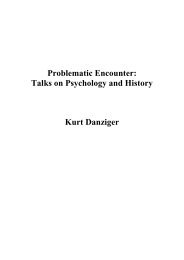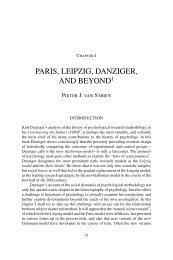The positivist repudiation of Wundt - Kurt Danziger
The positivist repudiation of Wundt - Kurt Danziger
The positivist repudiation of Wundt - Kurt Danziger
Create successful ePaper yourself
Turn your PDF publications into a flip-book with our unique Google optimized e-Paper software.
214 KURT DANZIGER<br />
Psychology.” 36 In that work the eminent methodologist <strong>of</strong> the Geisteswissenschuften<br />
attempted to settle accounts with the naturalistic tendency in psychology and to sketch<br />
the foundations <strong>of</strong> a very different kind <strong>of</strong> psychology required by the cultural sciences.<br />
Dilthey saw the experimental psychology <strong>of</strong> his time as part <strong>of</strong> the older tradition <strong>of</strong> “explanatory<br />
psychology,” dedicated to deriving the facts <strong>of</strong> human action and experience<br />
from a limited number <strong>of</strong> analytically hypothesized elements. He traced this tradition to<br />
Herbart, the two Mills, and Spencer and observed that the experimental techniques introduced<br />
by Fechner and Helmholtz greatly enhanced its power and influence. However,<br />
Dilthey noted with approval that <strong>Wundt</strong>, the most eminent representative <strong>of</strong> a systematic<br />
and self-conscious experimental psychology, had found it necessary to abandon the established<br />
tradition <strong>of</strong> “explanatory psychology.” <strong>Wundt</strong>’s principles <strong>of</strong> creative synthesis<br />
and psychic causality explicitly run counter to the Mill-Spencer tradition <strong>of</strong> psychological<br />
analysis and elementarism. Dilthey did not doubt the applicability <strong>of</strong> the<br />
analytic tradition to certain simple psychological processes; what he (and <strong>Wundt</strong>) objected<br />
to was the claim that this approach could be validly extended to complex psychological<br />
products and functions and that it constituted the necessary basis for all <strong>of</strong><br />
psychology.<br />
Dilthey expressed the belief that as the movement represented by <strong>Wundt</strong> developed<br />
strength, so the influence <strong>of</strong> the analytic “explanatory” tradition in psychology would<br />
decline. It is clear that he was too optimistic about the prospects for <strong>Wundt</strong>’s direction,<br />
for it proved to be quite unacceptable to most <strong>of</strong> the younger generation <strong>of</strong> psychologists.<br />
Dilthey’s paper became the target <strong>of</strong> a highly polemical reply by Ebbingha~s,~~ much <strong>of</strong><br />
which was not so much a defense <strong>of</strong> analytic psychology as an attack on Dilthey’s alternative<br />
<strong>of</strong> a descriptive psychology <strong>of</strong> value structures.<br />
In the present context one key point <strong>of</strong> Ebbinghaus’s position is <strong>of</strong> special relevance.<br />
Ebbinghaus correctly interpreted Dilthey’s critique as an attack on the conception <strong>of</strong> psychology<br />
as a natural science. However, in Ebbinghaus’s view, Dilthey had an oldfashioned<br />
understanding <strong>of</strong> science - he seemed to equate the general approach <strong>of</strong><br />
natural science with the special case <strong>of</strong> mechanics, a science based on the assumption <strong>of</strong><br />
the qualitative and quantitative equivalence <strong>of</strong> causes and effects. Perhaps mechanics<br />
was indeed the model for a psychologist like Herbart, but this was no longer true for later<br />
experimental psychology. Ebbinghaus credited Mach with the demonstration that what<br />
made an investigation scientific is not its use <strong>of</strong> mechanistic explanation but its concerns<br />
with functional relationships among observables. Thus, the law <strong>of</strong> association, for the<br />
kind <strong>of</strong> psychology that Ebbinghaus defended, does not claim anything about the nature<br />
<strong>of</strong> psychological forces but simply notes that a previous conjunction tends to lead to the<br />
reproduction <strong>of</strong> one idea when another is present. Ebbinghaus’s reply to Dilthey involved<br />
the argument that while a science <strong>of</strong> psychology modeled on Newtonian physics may be<br />
vulnerable to the latter’s criticisms, this was not true for a science <strong>of</strong> psychology modeled<br />
on Machian physics.<br />
Ebbinghaus, like KUlpe, tended to fall back on a Machian philosophy <strong>of</strong> science<br />
when addressing himself to fundamental questions about the status and subject matter <strong>of</strong><br />
psychology. In his systematic textbook, the Grundziige, he associated himself with the<br />
definition <strong>of</strong> psychology given in KOlpe’s Outlines <strong>of</strong> 1893 and with the position advocated<br />
by Mach in the Analysis <strong>of</strong>Sensution~.~* He pointed out that this position must<br />
not be misinterpreted as involving a limitation <strong>of</strong> psychology to “phenomena <strong>of</strong> consciousness,”<br />
rather it means that psychology is concerned with the dependence <strong>of</strong> the<br />
world <strong>of</strong> experience on an individual. For KUlpe’s awkward expression <strong>of</strong> the “corporeal





